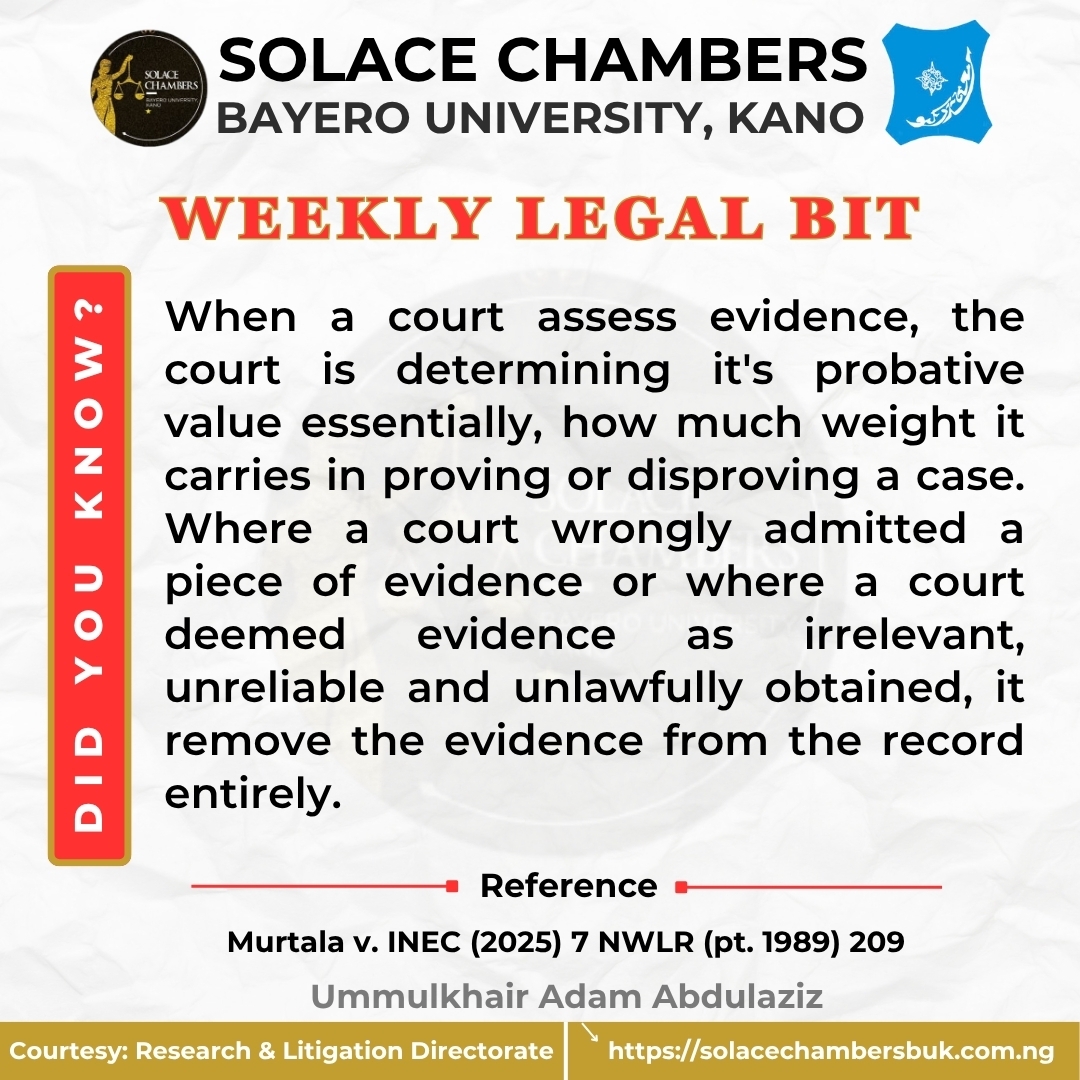DISTINCTION BETWEEN ASCRIPTION OF PROBATIVE VALUE AND EXPUNCTION OF DOCUMENT FROM EVIDENCE
When a court assess evidence, the court is determining it's probative value essentially, how much weight it carries in proving or disproving a case. Where a court wrongly admitted a piece of evidence or where a court deemed evidence as irrelevant, unreliable and unlawfully obtained, it remove the evidence from the record entirely.
In the realm of legal proceedings, evidence plays an essential role in proving or disproving a case in court, significantly impacting its strength or weakness. Due to it's importance, parties present evidence to persuade the judge and build a strong case. The strength or weakness of an evidence in proving or disproving a case lays in its relevance or legality, likewise, disregard of an evidence in a case result from it inadmissibility and illegality. Evidence can take various forms, including witnesses' testimony, documents, exhibits and records. When evidence is presented, some key processes occur: ascribing probative value and potential expunction of document. For clarity on these two crucial processes, reference can be made to the resent case of MURTALA V. INEC (2025) 7 NWLR (pt. 1989) 209.
The summary of the facts leading to the holdings of the supreme court is that, the appellant contested the election of governorship in Kogi State, on the platform of the 2nd appellant. The 2nd respondent also contested on the platform of the 3rd respondent. The 2nd respondent was returned by the 1st respondent as the elected candidate. Displeased with the result of the election, the appellant filed an election petition before the Kogi State Governorship Election Petition Tribunal on 2nd December, 2023. The matter was proceeded to trial, the appellant presented it oral and documentary evidence but failed to linked it with their allegations. The trial tribunal delivered it judgement, which it expunged the evidence of the PW1 and BVAS machines tendered, because the appellant failed to front-load the statement on oath of the said PW1 as requested by the First Schedule of the Electoral Act, 2022. It therefore dismissed the petition for lacking in merits. Aggrieved by the judgement, the appellants appealed to the Court of Appeal, which affirmed the decision of the trial tribunal. Still aggrieved, the appellants appealed to the supreme court, prayed to the court to depart from it previous decisions in OBI V. INEC (2023), ATIKU V. INEC (2023) and SHOWED V. INEC (2024). In resolving the appeal the Supreme Court considered the provisions of S.182 Constitution of the Federal Republic of Nigeria and S.134(1)(a) and of the Electoral Act 2022.
The supreme court drew guidance on the distinction between ascription of probative value and expunction of document from evidence. The court held thus:
The determination of probative value is an issue of assessment or evaluation of the document to determine the weight to be attached to the document in relation to the fact in issue the document is intended to prove, while expunction is an issue of admissibility. The two concepts must be kept separate. Ascription of probative value comes after admissibility. Expunction of a document and attribution of probative value are mutually exclusive, in the sense that if a document is expunged, it is treated as non-existent as if it is not part of the record of the court which the court will reckon with in determining the case of the parties. Conversely, ascription of probative value is as a result of reckoning with the exhibit or document as part of the record of the court.
This implies that, the attribution of probative value occurs when court evaluate the evidence scrutinizing and assessing the evidence adduced during the trial, with objective of determining it's weight in delivering judgement. As a general principle, before evidence can be admissible in court it must satisfy the court that the evidence is logically relevant to the fact in issue, and that it is lawfully obtained. Evidence that is unlawfully obtained and deemed irrelevant will be subject to removal, as it failed to satisfy the court its relevancy and legality to the fact in issue, this is where the court will expunged the evidence from the record in its entirety.
The supreme court further stated that:
In the instant case, notwithstanding the tribunal's error of describing the documents as expunged, the tribunal indeed looked at the said certified documents in juxtaposition with the appellants' witness deposition before coming to the conclusion that the appellants did not link them or tie them to specific part of the appellants' case. Thus, the purported expunction came after the tribunal had considered the probative value of the said documents.
In court proceedings only relevant and admissible evidence should be accepted, if a court wrongly admitted inadmissible evidence the counsel to the party may address the court and make oral submission to request the court to expunged the evidence. It is the duty of the court to expunged an inadmissible evidence. Irrelevant evidence has no probative value and may potentially distract the judge. The court's evaluation of evidence is very essential because it impacts on the decision of the court. Therefore the more compelling the evidence is in proving or disproving a case, the higher it's probative value. In simple terms, the success of a case hinges on the strength of the evidence presented by the parties.
About Author:
Ummulkhair Adam Abdulaziz is a member of research and Litigation Directorate, Solace Chambers, Bayero University Kano. She can be reach via +2347044411140



Comments
Post a Comment